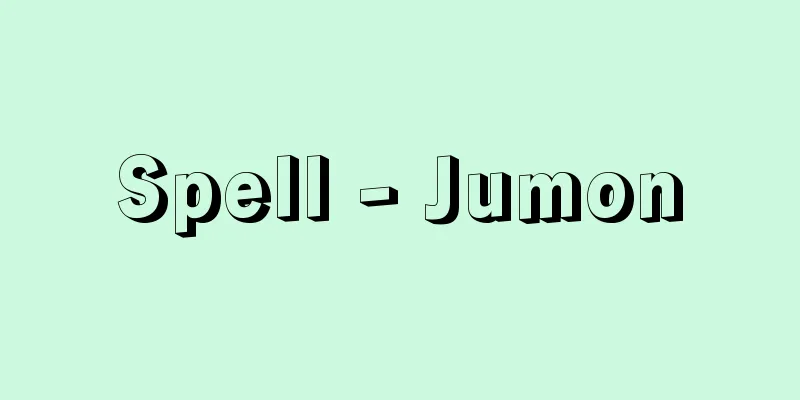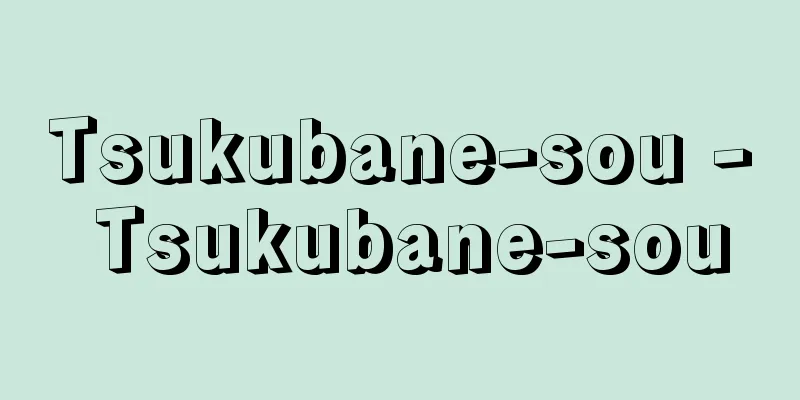Spell - Jumon

|
Words believed to have mystical or magical effects. They are usually formulated, and it is believed that reciting them will bring good luck and happiness or prevent disasters. They are sometimes used to inflict misfortune such as illness or death on enemies. In Melanesia, spells are at the center of magical acts. For example, in the Trobriand Islands, the word megwa refers to spells as well as magic in general, and spells are almost always recited when trying to do something. When going to war, spells are cast on the tips of spears to make them sharper, and spells are cast on shields to prevent enemy spears from piercing them. They believe that spells will make their main crop, yams, bigger and more beautiful. They also have to recite spells when building canoes for long-distance voyages, which are important to them. There are many different types of spells for different purposes, and people must memorize them accurately. It is said that even one incorrect recitation will make them ineffective. Generally speaking, chanting spells is a part of a magical act, and spells are not effective on their own, but are effective when used in the overall magical ritual, sometimes in conjunction with magical objects. However, which is most important - the spell, the entire ritual, or the magical objects - varies from society to society. In many Melanesian societies, such as the Trobriand Islands, the spell is emphasized and it is required to recite it exactly word for word. In Africa, the entire ritual or the magical objects are more often emphasized, and spells are usually recited, but it is often acceptable to change some of the words. Belief in spells is based on a belief in the power of words. Also, the more mysterious a spell is, the more effective it is thought to be, so spells are kept secret, and the words of the spell are often old or difficult to understand, not used in daily life. The spell "Abiraunkensowaka" is often used in Japanese folk beliefs, and is originally the Buddhist phrase "Abiraunkesabaka." However, most people use it without knowing its meaning; rather, just like "Chichinpuipui," it is thought that the fact that the meaning of the word is unknown gives it a mysterious quality and makes it effective. [Itabashi Masami] Source: Shogakukan Encyclopedia Nipponica About Encyclopedia Nipponica Information | Legend |
|
神秘的、呪術的な効果をもつと信じられていることば。たいてい定型化されており、これを唱えることによって幸運、幸福を招いたり、災禍を防ぐことができると考えられている。ときには敵に病気や死などの不幸を与えるために使われる。メラネシアでは呪文が呪術行為の中心をなしており、たとえばトロブリアンド島では、メグワという語は呪文であるとともに呪術一般をもさし、なにかをしようとするときは、ほとんどかならず呪文が唱えられる。戦争に行くときには槍(やり)の穂先に呪文をかけて切れをよくし、盾には敵の槍が突き入らないように呪文をかける。主作物であるヤムイモは呪文によって大きくりっぱなものになると考えている。彼らにとって重要な意味をもつ遠洋航海に使うカヌーをつくるときも、呪文を唱えなければならない。呪文はそれぞれの目的によって数多くの種類があり、人々はそれらを正確に覚えなければならない。一語でも誤って唱えると、効力を失うとされている。 一般に呪文を唱えることは呪術的行為の一部であり、呪文は単独では効果がなく、呪的儀礼全体のなかで、ときには呪具を併用することによって、効力を生じると考えられている。しかし、呪文、儀礼全体、呪具のどれがもっとも重視されるかは、社会によって異なり、トロブリアンド島のようにメラネシアの多くでは呪文が重視され、一語一句正確に唱えることが要求される。アフリカではむしろ儀礼全体、あるいは呪具が強調されることが多く、呪文もたいてい唱えられるが、ことばの一部を変えてもよいとされることが少なくない。呪文に対する信仰は、ことばのもつ力に対する信仰に基づいている。また呪文は、神秘的であればあるほど効力をもつと考えられるので、呪文を秘密にしたり、呪文のことばも、日常では使わない古いことばであったり、難解なことばであったりする。日本の民間信仰でしばしば使われる呪文の「アビラウンケンソワカ」は本来仏教のことば「阿卑羅吽欠莎婆訶」であるが、ほとんどの人はその意味を知らずに使っているのであり、むしろ「ちちんぷいぷい」と同じように、ことばの意味が不明であるということが、このことばに神秘性を与え、効力があると考えるのである。 [板橋作美] 出典 小学館 日本大百科全書(ニッポニカ)日本大百科全書(ニッポニカ)について 情報 | 凡例 |
<<: Zhu-ye Chi-xin; Chu-yeh Ch`ih-hsin
Recommend
Sully Prudhomme
1839‐1907 French poet. His real name was René-Fran...
Pseudo-urbanization
...As a result of improvements in hygiene and med...
Osako - Osako
...It has been said since ancient times that it i...
van Wesel, A.
…In painting, Jan Malouel (?-1415), the Limbourg ...
Courier - Hikyaku
A person who delivers letters and documents. The ...
Shuji Terayama
Poet, tanka writer, playwright, screenwriter, and...
Albani, F.
...This is the first example of Baroque decorativ...
Ireland, D. (English spelling) IrelandD
…The Australian representatives of the countercul...
Lancaster Dynasty
A dynasty of English kings (1399-1461, 1370-1471)....
Yi Yi - Igei
…A heroic deity of Yi origin that appears in Chin...
Sichuan [Province] - Sichuan
A province in the upper reaches of the Yangtze Riv...
Ariel - Possible
…He served as a university professor, director of...
Screw Cord - Kai no O
During the Kamakura and Muromachi periods, the mo...
River mist
Fog that forms on the surface of a river or its s...
Aivazovsky, IK - Aivazovsky
…The history of Armenian art is older than the co...








![Ojima [town] - Ojima](/upload/images/67cb1d46cb355.webp)
